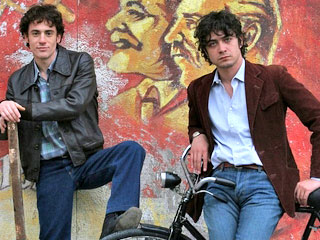Next story: Indiana Jones and the Kingdom of the Crystal Skull
My Brother is an Only Child
by George Sax
THE NONCONFORMIST
The personal is certainly political in Daniele Luchetti’s densely narrated My Brother Is an Only Child. The inverse is also true, of course. The two dynamics are so mutually reciprocal in this film that it’s practically impossible to disentangle them from each other, although by the end, Luchetti seems to be privileging one over the other.
My Brother (a deceptively silly title for a serious film) tracks the experiences—intimate, familial, social and political—of two brothers during the decade beginning in the early 1960s. The tumultuous, world-altering events of that period are crudely, often amusingly, and sometimes pathetically incarnated in one of them, Accio, the younger of the two.
Watch the trailer for "My Brother is an Only Child"
He and his barely solvent family live in Latina, a small urban backwater 400 miles from Rome that’s dominated by an industrial firm that employs his father, and, eventually, Manrico (Riccardo Scamarcio), the elder brother. He’s the ripely attractive, carelessly charismatic, and politically manipulative one referred to by that title.
Accio (played by Vittorio Emanuelo Propezio at 14, Elio Germano as a young man) smarts and burns with resentment in the shadow of his big brother. His one potential advantage, his intellectual gifts, is blunted when his dismissive, hard-pressed parents refuse to pay his fees for entrance to a classical high school curriculum.
Previously, his quest for spiritual transcendence and supervised scourging of his sinfulness at a seminary is thwarted when the priests respond matter-of-factly to his confessions of piddling erotic transgressions. Outraged, Accio lands back in Latina at a technical high school, and joins the local fascist party, which seems to be a slackly organized, rather irrelevant group.
The film never explicitly indicates it, but it’s possible to surmise that he takes this course because Manrico is a Communist. It is clear that he’s still seeking a channel for his restless, resentful passion. He accomplishes little beyond a few minor incidents of disruption and mischief, including one in which some young fellow black shirts rough him up because he’s disrespectfully challenged a party elder.

Throughout the film’s chronicle, Accio is ineffectual, even after he switches allegiance to his brother’s young Communists. (They have a penchant for florid political hackwork, as when Manrico and a friend turn Beethoven and Schiller’s Ode to Joy into a Stalinist catechism.)
Accio’s commitment to human betterment is authentic, but his efforts are doomed by his temperament and his times. As is his yen for Manrico’s girl, Francesca (Diane Fleri), a leftist from Turin who is as ripely and accessibly attractive as his brother.
Accio’s political and personal failures are probably due as much to his perilously low social status and Italy’s fractious politics and historically corrupt governance as to his conflicted personality. The film leaves that call to the viewer; its tone is more amusement and irony, and, eventually, sympathy than political judgment.
Indeed, My Brother is constantly and deliberately uninformative about the regime challenges and societal upheavals taking place across Europe during the late 1960s. There’s no mention of Vietnam or Dubcek’s Prague Spring, and the strikes and protests that shut down Paris and nearly toppled de Gaulle’s government before he made concessions are only mentioned in passing by Accio in a voiceover. There’s nothing specific about the Red Brigades, but late in the film a couple of incidents seem to allude to that movement.
Luchetti, who co-wrote My Brother, keeps his focus on Accio, and we really experience things through his adventures. He’s like a politically engaged Candide, but there’s a subtext that suggests he’s as much fortune and society’s fool as his own. Germano expertly makes him a perversely admirable, sympathetic and unexpectedly plausible youngster.
At the end, the filmmakers give him a measure of dignity, as he undertakes an individual action on behalf of his family and neighbors. This is a little too arbitrarily redemptive and bittersweet. Still, this final gesture doesn’t really vitiate the spirited, involving portrait of Accio provided by Luchetti and Germano.
blog comments powered by Disqus
|
Issue Navigation> Issue Index > v7n21: Grandmaster Block (5/22/08) > Film Reviews > My Brother is an Only Child This Week's Issue • Artvoice Daily • Artvoice TV • Events Calendar • Classifieds |









 Current Issue
Current Issue